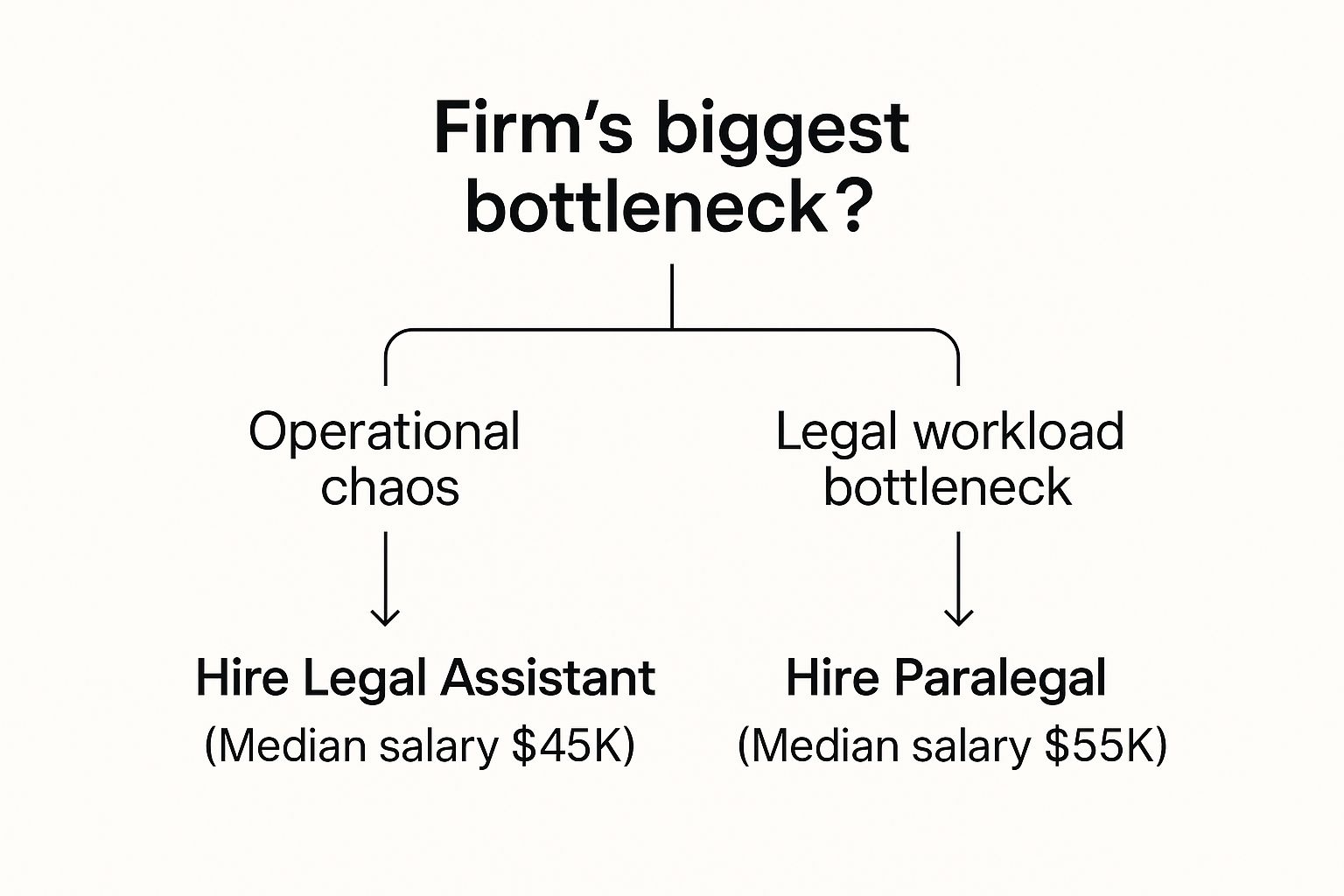
 13 minutes read
13 minutes read
Let's cut the fluff. The real difference between a legal assistant and a paralegal is this: a legal assistant manages your chaos, while a paralegal handles your cases. One keeps your firm from imploding under the weight of administrative tasks; the other is a force multiplier for your attorneys, tackling the substantive legal work that actually moves the needle.
I've seen far too many firms hire a paralegal and then get mad when their calendar is still a mess. It’s a classic, expensive mistake. You wouldn't hire a chef to fix your plumbing, so stop hiring for the wrong legal role.
Look, I get the confusion. In the wild, people throw these titles around like they’re interchangeable. But inside a law firm, treating them as the same role is a recipe for operational disaster and a one-way ticket to frustration. It’s like confusing a quarterback with the general manager—both are critical to winning, but you don't ask one to do the other's job.
Your legal assistant is the operational backbone, the person who keeps the lights on and the phones answered. They’re the reason you can find a client file without a search party. A paralegal, on the other hand, is in the legal trenches with your attorneys—drafting pleadings, digging through discovery, and getting cases trial-ready.
Let's draw a bright line between the two.
Here’s a no-BS breakdown of how these two critical roles stack up. Pay attention, this might be on the test later.
| Attribute | Legal Assistant | Paralegal |
|---|---|---|
| Primary Focus | Administrative and clerical support for the firm | Substantive, billable legal work under attorney supervision |
| Core Tasks | Scheduling, client intake, filing, billing, office logistics | Legal research, drafting documents, case management, trial prep |
| Education | High school diploma or associate's degree often sufficient | Associate's or bachelor's degree, often with a paralegal certificate |
| Impact on Firm | Boosts operational efficiency and client service | Increases attorney capacity and firm's billable output |
As you can see, one oils the machine, the other helps build the product. Both are vital, but they solve completely different problems.

Let's be brutally honest: a paralegal is not an admin with a fancier title. Thinking that way is a rookie mistake that will cost you billable hours and case momentum. A sharp paralegal is a direct extension of your legal team, a force multiplier who lives and breathes substantive legal work.
They’re the ones buried in case law, drafting the motions your attorneys will sign, and preparing for trials. A great paralegal owns the discovery process that can make or break your case and conducts the client interviews that uncover pivotal facts. This isn't just "support"; it's high-level execution that frees up your attorneys to focus on high-stakes strategy and client counsel.
This is where you see the real ROI.
A paralegal’s duties go way beyond filing. Their work demands a real understanding of specific areas of law, from drafting pleadings and managing discovery to interviewing witnesses and providing trial support. In short, they handle the detailed legal groundwork that’s mission-critical for every single case.
You should expect a professional paralegal to have credentials that back this up. This isn't a job you just "figure out."

The Bottom Line: You hire a paralegal to take on billable work an attorney would otherwise have to do. Their value is measured in increased capacity and direct contributions to case outcomes, not just office efficiency.
Look for designations like Certified Paralegal (CP) or Registered Paralegal (RP). These aren't just letters after a name; they’re proof that someone has met a professional standard you can actually rely on. Understanding the different paralegal certification requirements is a crucial first step before you even think about writing that job description.

Let me be clear: without a killer legal assistant, your law firm will grind to a halt. They are the central hub of communication, organization, and client relations—the administrative engine that keeps the entire practice from descending into chaos.
People confuse this role with a paralegal's all the time, but they couldn't be more different. A legal assistant is a master of the business of law. Their entire job is to make the day-to-day operations so smooth that your attorneys and paralegals can focus on, you know, practicing law.
Their tasks aren't billable, but their impact on your bottom line is massive. A great legal assistant saves your expensive attorneys from doing cheap administrative work. Skimping here is a classic way to burn money and sanity.
So, what does a legal assistant actually do? They're the ultimate multitasker, juggling the critical administrative duties that would otherwise sink your firm.

Think about it this way: studies show that lawyers often spend only 2.9 hours per day on billable tasks. A skilled legal assistant directly attacks the administrative black hole that swallows the rest of an attorney's day.
They are the operational core. While they don't perform substantive legal work like a paralegal, their organizational skills are everything. To find the right one, you have to ask the right questions, which is why having a solid set of legal assistant interview questions ready to go is non-negotiable.
Alright, let's put these two roles side-by-side where it really counts. Forget the fuzzy job descriptions. The true difference between a legal assistant and a paralegal is revealed by who does what when the pressure is on. This isn't just about job titles—it's about the fundamental divide between running the office and running the case.
I’ve seen firms hire a paralegal expecting an administrative superstar, only to get frustrated when their inbox is still a disaster. I've also watched them hire a legal assistant and then wonder why that person can't draft a discovery request. Let’s draw a clear line in the sand.
This is where the rubber meets the road. Let's break it down using a single legal motion as an example.
A legal assistant makes sure that motion gets where it needs to go. They handle the e-filing, confirm receipt with the court clerk, update the firm’s calendar with new deadlines, and notify the client that it has been filed. They own the administrative lifecycle of the document.
A paralegal, on the other hand, is the one who likely drafted that motion under an attorney's supervision. They performed the initial legal research, pulled the relevant case law, and structured the arguments. They own the substantive creation of the document.
See the difference? The assistant manages the logistical "how" and "when," while the paralegal handles the legal "what" and "why."
Detailed Role Differentiators Legal Assistant vs Paralegal
| Area of Comparison | Legal Assistant (Administrative Focus) | Paralegal (Substantive Legal Focus) |
|---|---|---|
| Education & Certification | No formal legal education required; associate's degree or certificate is common. Focus is on office administration skills. | Often holds an associate's or bachelor's degree in paralegal studies or a related field. Certification (e.g., NALA, NFPA) is highly valued. |
| Key Responsibilities | Scheduling, calendar management, client intake, filing (physical and electronic), answering phones, managing correspondence. | Legal research, drafting legal documents (motions, pleadings, discovery), case management, client interviews, trial preparation. |
| Client Interaction | Primary point of contact for scheduling, billing questions, and providing non-legal status updates. Manages the client relationship administratively. | Interacts with clients on the substantive aspects of their case, such as gathering facts, explaining procedures (under attorney supervision), and preparing them for depositions. |
| Billing Status | Work is generally considered administrative overhead and is not billable to clients. | Work is often billable to clients at a lower rate than an attorney's, directly contributing to firm revenue. |
This isn’t subtle. One role is about keeping the business running; the other is about executing the legal work.
Here’s the part that hits your wallet. A paralegal’s work is often billable, directly generating revenue. A legal assistant’s work, while critical, is an operational expense.

A paralegal’s value is measured in their ability to free up an attorney for higher-value strategic work, effectively increasing the firm's billable capacity. A legal assistant’s value is measured in the firm’s overall efficiency and ability to function without administrative chaos.
It’s not about which role is "better." It's like comparing an engine to a chassis—you need both to get anywhere, but they do completely different jobs. Confusing the two is a direct path to burning cash and frustrating your entire team.
Let's talk money. You need to understand the salary gap between these roles because it reflects the different value they bring to your firm. You get what you pay for.
Simply put, a paralegal’s ability to perform substantive, billable legal work justifies a higher salary from day one. According to the U.S. Bureau of Labor Statistics, the median annual wage for paralegals and legal assistants combined was approximately $66,460 in 2023.
But that average is misleading. The top earners in this category—almost always certified and experienced paralegals—can pull in salaries nearing $98,830. If you want the gritty details, you can dig into the full BLS report on legal professional wages.
The career paths here aren't just different rungs on the same ladder; they're two completely different ladders leading to separate parts of the building. One path is about mastering the business of law; the other is about deepening legal expertise.
A highly effective legal assistant often grows into roles like office manager, director of administration, or even COO. Their career is about making the entire practice a well-oiled machine.

A paralegal's career growth is tied to legal expertise. They don't just get better at their job; they become more valuable assets on complex cases.
A skilled paralegal, on the other hand, advances by taking on more complex legal work. Their path leads to titles like senior paralegal, case manager for high-stakes litigation, or a paralegal supervisor mentoring a team. Their value skyrockets as their specialized legal knowledge becomes indispensable.
Understanding this split is critical. When you hire, you're not just filling a seat; you're making a long-term bet on a skill set that should align with your firm's biggest needs.
Alright, decision time. You’ve got one spot to fill. Who gets the offer? Stop thinking about job titles and start diagnosing your biggest pain point. Where is your firm bleeding time and money right now?
Are your attorneys drowning in administrative quicksand? I'm talking about missing deadlines because they're stuck scheduling calls or hunting for a document they swear they saw last week. That’s operational chaos. You need a legal assistant, and you probably needed one yesterday.
Or is the problem that your lawyers are bogged down with substantive but routine legal work? Think discovery reviews, drafting initial pleadings, or running preliminary research. If that’s your bottleneck, your problem is billable capacity. Hiring a paralegal will give you a much bigger and faster return on your investment.
This isn't rocket science. Use this decision tree to figure out where the real problem lies.

The choice hinges on the type of work that's slowing you down. One hire plugs administrative leaks; the other expands your legal firepower.

The real difference between a legal assistant and a paralegal becomes obvious when you reframe the question from "Who should I hire?" to "What problem am I trying to solve?" One organizes the battlefield; the other helps fight the battle.
If your gut says you need more legal muscle, your next step is to get serious about that role. We put together a no-nonsense guide on what to look for when hiring a paralegal that cuts through the noise.
Making the right choice here isn't just about filling a seat. It's a strategic move. Choose wisely.
Let's knock out a few questions I hear all the time from firm owners who are about to make a hiring mistake. Here are the straight answers.
No. Full stop. Absolutely not. This is one of the brightest red lines in our field. A paralegal does substantive legal work, but always under the direct supervision of an attorney.
They cannot give legal advice, represent clients in court, or set legal fees. Doing so is the unauthorized practice of law, and the penalties are severe. They are an extension of the attorney, not a replacement. Don't mess this one up.
It's one of the best. I’ve seen countless successful paralegals start this way. Why? Because you get a real-world, front-row seat to how a law firm actually operates—the pace, the pressure, the systems.
It’s the ultimate "try before you buy" for a legal career. You’ll know for sure if you have the stomach for it before you drop a bunch of time and money on a paralegal degree. That hands-on experience is gold.
Mostly, yes, but "legal assistant" is the modern, more accurate term. The paralegal profession didn't really even exist until the late 1960s. You can read a bit about the history of the paralegal profession if you're into that sort of thing.

Historically, a "legal secretary" was all about typing and dictation. Today's "legal assistant" has a much broader, more dynamic role that's central to running the firm's operations.
Ready to stop mortgaging your office ping-pong table to find top talent? At HireParalegals, we connect US law firms with a curated network of over 10,000 pre-vetted legal professionals. Cut your hiring time to 24 hours and your payroll costs by up to 80%. Visit https://hireparalegals.com to see your custom shortlist. (Toot, toot!)